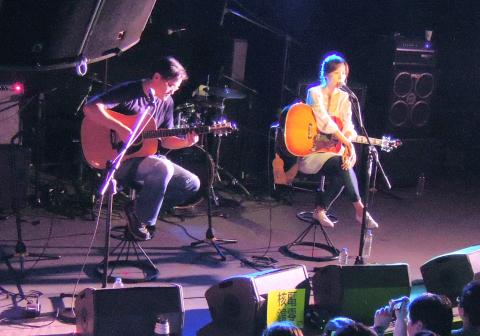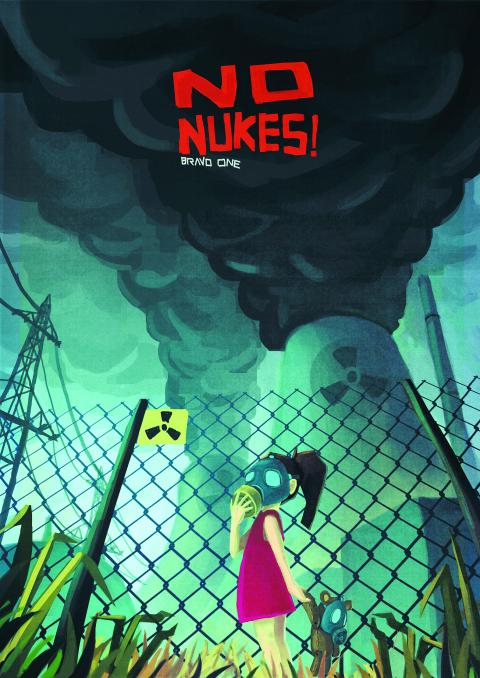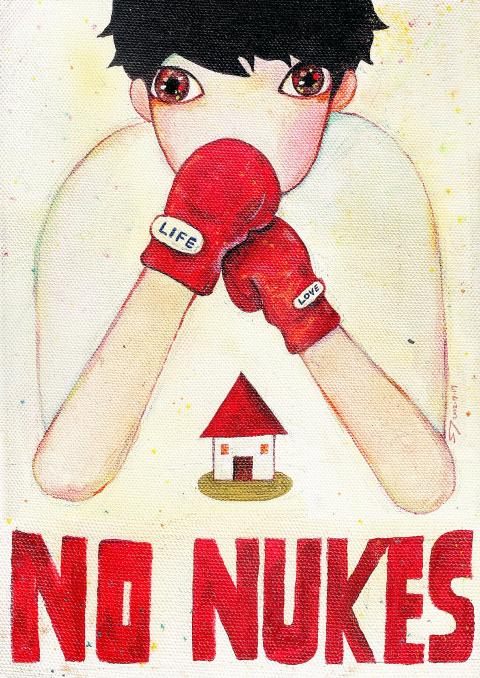Local indie-pop musicians and the Green Citizen Action Alliance (GCAA) held a concert — “Nuclear Power, Go Zero” — at a live music house in Taipei on Saturday, where protest signs reading, “I am human, no nukes” and “No nukes in my music” could be seen all over the venue. The concert consisted of nine acts, including pop singer Cheer Chen, who was joined by her boyfriend, veteran pop producer Tiger Chung, a rare treat having them sing on stage together for the anti-nuclear cause. Nearly 70 anti-nuclear posters were collected from Taiwanese artists for the event. The posters will be on display at exhibitions throughout Taiwan.
The Wall and GCAA held “Nuclear Power, Go Zero” on Saturday at the popular Taipei music venue. Taiwan’s punk pioneers Loh Tsui Kweh Commune, Hakka hip-hop troupe Kou Chou Ching, the Village Armed Youth Band, Hakka folk singer Lin Sheng-xiang, Zulin Wu, and Aboriginal singer Panai took to the stage throughout the concert. It was a lively concert, with various anti-nuclear speeches, a text-messaging petition event, and at the end of the concert the pop icon couple Cheer Chen and Tiger Chung took the stage together, crooning late into the night.
When Chen was on stage singing at this year’s Hohaiyan Gongliao Rock Festival in July, four audience members with anti-nuclear signs came on the stage. Preceding her encore, Chen said that she had no idea the anti-nuclear activists would take the stage, but that she supported their cause and hoped to protect the environment against pollution. “I hope that Taiwan doesn’t become an island nation full of danger and greed,” she said.

Photo: Chen Yi-ching, Liberty Times
照片:自由時報記者陳怡靜
GCAA secretary-general Tsuei Su-hsin said that in Japan, where one-third of its energy is nuclear powered, they already have a strong non-nuclear campaign, adding that in Taiwan, where nuclear power only makes up one-tenth of energy sources, the chances of successfully abandoning nuclear energy are much higher, going on to say that artists and musicians are also becoming actively involved in the cause.
Since the Fukushima Dai-ichi nuclear disaster last March, a “Goodbye to nuclear power” movement petition has already attracted nearly 8 million signatures, including signatures from renowned author Hiroki Murakami, Nobel prize-winning author Kenzaburo Oe, and prominent manga artist Hayao Miyazaki. Artist Yoshimoto Nara also created an anti-nuclear poster, which has gone viral among netizens.
Among Taiwan’s artists, there is also a growing anti-nuclear movement. Huang Mi-lu, who is in charge of Petit Deer Cinema, used Facebook to collect more than 70 anti-nuclear posters, including submissions from popular artists such as Hsu Chih-hung, Chen Sen-tien, a graphic designer who goes by the pseudonym 57, and Baozi. The main theme of all of their creations was, “I am human, no nukes.” On Saturday, more than 50 of the posters were on display at The Wall.

Photo courtesy of the Wall
照片由the Wall提供
(Liberty Times, Translated by Kyle Jeffcoat)
獨立音樂界與台灣綠色公民行動聯盟協會週六聯手舉辦「核電歸零音樂會」,標語為「我是人,我反核!」與「我的音樂不插核電!」,九組音樂人參與義演,歌手陳綺貞和鍾成虎這對「情侶檔」,也為反核難得同台演出。台灣插畫家一個月內就募集近七十張反核插畫海報,還將在台灣各地接力展出。
北市知名樂團演出空間「The Wall」,週六與綠色公民行動聯盟舉辦「核電歸零音樂會」,濁水溪公社、拷秋勤、農村武裝青年、林生祥、吳志寧、巴奈等輪番上陣,現場氣氛狂熱,穿插反核聲明、簡訊連署等活動,歌手陳綺貞與男友鍾成虎則在深夜時壓軸登場。

Photo provided by Petit Deer Cinema
照片由小路映畫提供
陳綺貞七月在貢寮海洋音樂祭壓軸演出時,曾有四位觀眾手持反核標語跑上台,當時陳綺貞在安可曲前公開向觀眾說,她事前並不知道反核人士會跑上台來,但她支持這群人的理念,她也不希望環境受到污染。「希望台灣不要成為危險又貪婪的島國。」
綠盟秘書長崔愫欣表示,日本電力有三分之一是核電,都已嘗試「零核電」,台灣核電僅一成多,更有本錢零核電,藝文和音樂界人士已陸續響應。
日本三一一核災後,不只「核電再見」連署人次達八百萬筆,包括知名作家村上春樹、諾貝爾文學獎得主大江健三郎、動畫大師宮崎駿,知名插畫家奈良美智也親手繪製反核海報,引發網友瘋狂轉載。

Photo provided by Petit Deer Cinema
照片由小路映畫提供
台灣插畫界也有反核風,小路映畫負責人黃米露透過臉書號召,一個月就募集近七十張反核插畫,包括熱門插畫家徐至宏、陳森田、57、包大山等,均以「我是人,我反核」為創作主軸,週六起在The Wall展出超過五十幅海報。
(自由時報記者陳怡靜、林佳宏)

A: Have you seen the reality TV show “Culinary Class Wars?” B: Sure! It’s a competition between two classes: 20 celebrity chefs dubbed the “white spoons” versus 80 non-celebrity chefs dubbed the “black spoons.” A: The two judges are master chef, Paik Jong-won, and South Korea’s only three-Michelin-star chef, Anh Sung-jae. B: And the grand prize is $300 million Korean won. A: After watching the show, I really wanna have some Korean food. A: 你有看電視實境秀《黑白大廚:料理階級大戰》嗎? B: 當然啦!就是20位「白湯匙」名廚,和80位「黑湯匙」廚師的競賽。 A: 評審則是廚神白種元,及南韓唯一的米其林三星主廚安成宰。 B: 冠軍還可獲得3億韓元獎金呢! A: 看完節目後我現在好想吃韓式料理喔。 (By Eddy Chang, Taipei Times/台北時報張聖恩)

A: As reality TV show “Culinary Class Wars” causes a sensation, it may be more difficult to make a reservation at the show’s judge Paik Jong-won’s Taipei restaurant, Bornga Korean BBQ. B: The other judge, Anh Sung-jae, also served as a guest chef at Regent Taipei last June. A: Korean food has become a new trend in Taiwan lately, and restaurants such as Samwon Garden are quite popular. B: But that restaurant is so pricey. A: Then try the more affordable places, like my favorite, OKAY Korean BBQ, or others such as Annyeong Korean BBQ and OvenMaru Chicken. A:

Colorado has taken a pioneering move towards protecting consumer privacy in the age of brain-computer interfaces. With the rise of neurotechnology, which involves technology that monitors and interacts with the brain, data privacy concerns are coming to a head. In response to growing anxieties, Colorado has become the first state in the US to pass an amendment that safeguards the privacy of human brainwaves. On April 17, Colorado announced an update to its Privacy Act, which went into effect on August 6. The new Colorado Privacy Act classifies brainwaves as “sensitive personal information,” offering them the same protections that

Continued from yesterday(延續自昨日) https://www.taipeitimes.com/News/lang Neurotechnology used to be limited to scientific labs and hospital settings. However, many new devices that can record consumers’ brainwaves or analyze the brain in other ways have been launched in recent years. Often marketed outside the realm of medical equipment, these devices evade the existing safety and privacy standards for healthcare devices. Experts are raising concerns about this lack of oversight, fearing the potential for these tools to become mind-reading devices without users’ consent or knowledge. Other US states are considering similar regulations to protect their citizens in regard to neuro data gathered by technology companies. Colorado’s